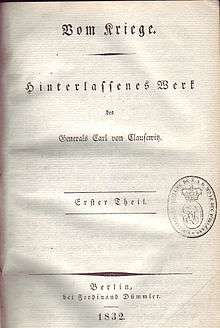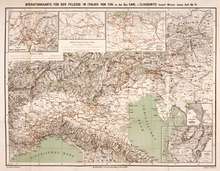On War

Vom Kriege (German pronunciation: [fɔm ˈkʁiːɡə]) is a book on war and military strategy by Prussian general Carl von Clausewitz (1780–1831), written mostly after the Napoleonic wars, between 1816 and 1830, and published posthumously by his wife Marie von Brühl in 1832. It has been translated into English several times as On War. On War is actually an unfinished work; Clausewitz had set about revising his accumulated manuscripts in 1827, but did not live to finish the task. His wife edited his collected works and published them between 1832 and 1835. His 10-volume collected works contain most of his larger historical and theoretical writings, though not his shorter articles and papers or his extensive correspondence with important political, military, intellectual and cultural leaders in the Prussian state. On War is formed by the first three volumes and represents his theoretical explorations. It is one of the most important treatises on political-military analysis and strategy ever written, and remains both controversial and an influence on strategic thinking.
History
Clausewitz was among those intrigued by the manner in which the leaders of the French Revolution, especially Napoleon, had changed the conduct of war through their ability to motivate the populace and to gain access to the full resources of the state; thus unleashing war on a greater scale than had previously been seen in Europe. Clausewitz was well educated and had strong interests in art, history, science, and education. He was a professional soldier who spent a considerable part of his life fighting against Napoleon. The insights he gained from his political and military experiences, combined with a solid grasp of European history, provided the basis for the book.
Synopsis

The book contains a wealth of historical examples used to illustrate its various concepts. Frederick II of Prussia (the Great) figures prominently for having made very efficient use of the limited forces at his disposal, though Napoleon is perhaps the central figure.
According to Azar Gat, the "general message" of the book was that "the conduct of war could not be reduced to universal principles."[1] Among many strands of thought, three stand out as essential to Clausewitz's concept:
- War must never be seen as having any purpose in itself, but should be seen as an instrument of Politik - a German word that conflates the meanings of the English words policy and politics: "War is not merely a political act, but also a real political instrument, a continuation of political commerce, a carrying out of the same by other means."[2]
- The military objectives in war that support one's political objectives fall into two broad types: "war to achieve limited aims" and war to "disarm" the enemy: "to render [him] politically helpless or militarily impotent."
- All else being equal, the course of war will tend to favor the party with the stronger emotional and political motivations, but especially the defender (contrary to the common prejudice that soldiers generally endorse aggressive warfare).
Some of the key ideas (not necessarily original to Clausewitz or even to his mentor Gerhard von Scharnhorst) discussed in On War include (in no particular order of importance):
- the dialectical approach to military analysis
- the methods of "critical analysis"
- the uses and abuses of historical studies
- the nature of the balance-of-power mechanism
- the relationship between political objectives and military objectives in war
- the asymmetrical relationship between attack and defense
- the nature of "military genius"
- the "fascinating trinity" (Wunderliche Dreifaltigkeit) of war
- philosophical distinctions between "absolute or ideal war," and "real war"
- in "real war," the distinctive poles of a) limited war and b) war to "render the enemy helpless"
- "war" belongs fundamentally to the social realm, rather than the realms of art or science
- "strategy" belongs primarily to the realm of art
- "tactics" belongs primarily to the realm of science
- the essential unpredictability of war
- the "fog of war"
- "friction"
- strategic and operational "centers of gravity"
- the "culminating point of the offensive"
- the "culminating point of victory"
Clausewitz used a dialectical method to construct his argument, leading to frequent modern misinterpretation because he explores various—often opposed—ideas before coming to conclusions.
Modern perception of war are based on the concepts Clausewitz put forth in On War, though these have been very diversely interpreted by various leaders (e.g., Moltke, Vladimir Lenin, Dwight D. Eisenhower, Mao Zedong, etc.), thinkers, armies, and peoples. Modern military doctrine, organization, and norms are all based on Napoleonic premises, even to this day—though whether these premises are necessarily also "Clausewitzian" is debatable.
The "dualism" of Clausewitz's view of war (i.e., that wars can vary a great deal between the two "poles" he proposed, based on the political objectives of the opposing sides and the context) seems simple enough, but few commentators have proven willing to accept this crucial variability—they insist that Clausewitz "really" argued for one end of the scale or the other. On War has been seen by some prominent critics as an argument for "total war".[a] It has been blamed for the level of destruction involved in the First and Second World Wars, but it seems rather that Clausewitz (who did not actually use the term "total war") had merely foreseen the inevitable development that started with the huge, patriotically motivated armies of the Napoleonic wars. These wars resulted (though war's evolution has not yet ended) in the atomic bombing of Hiroshima and Nagasaki, with all the forces and capabilities of the state devoted to destroying forces and capabilities of the enemy state (thus "total war"). Conversely, Clausewitz has also been seen as "The preeminent military and political strategist of limited war in modern times." (Robert Osgood, 1979)
Clausewitz and his proponents have been severely criticized by competing theorists--Antoine-Henri Jomini in the 19th century, B. H. Liddell Hart in the mid-20th century, and Martin van Creveld and John Keegan more recently. On War is a work rooted solely in the world of the nation state, says historian Martin Van Creveld, who alleges that Clausewitz takes the state "almost for granted" as he rarely looks at anything previous to Westphalia. He alleges that Clausewitz does not address any form of intra/supra-state conflict, such as rebellion and revolution, because he could not theoretically account for warfare before the existence of the state. Previous kinds of conflict were demoted to criminal activities without legitimacy and not worthy of the label "war." Van Creveld argues that "Clausewitzian war" requires the state to act in conjunction with the people and the army, the state becoming a massive engine built to exert military force against an identical opponent. He supports this statement by pointing to the conventional armies in existence throughout the 20th century. However, revolutionaries like Karl Marx and Friedrich Engels did derive some inspiration from Clausewitzian ideas.[3]
English translations
- 1873. Graham, J.J. translator. Republished 1908 with extensive commentary and notes by Victorian imperialist F.N. Maude.[4]
- 1943. O. J. Matthijs Jolles, translator (New York: Random House, 1943). This is viewed by some modern scholars as the most accurate existing English translation.
- 1968. Edited with introduction by Anatol Rapoport. Viking Penguin. ISBN 0-14-044427-0. This is badly dated (based on the 1873 Graham translation), severely abridged (leaving out, for instance, Book Six on defense—which Clausewitz considered to be the stronger form of warfare), and badly biased (because of its Vietnam War era and the editor's hostility to "neo-Clausewitzian" Henry Kissinger).
- 1976/1984. Howard, Michael, and Peter Paret, editors and translators. Princeton University Press. ISBN 0-691-05657-9.
See also
Concepts
Books
- Anabasis and Hellenica by Xenophon
- Commentarii de Bello Gallico by Gaius Julius Caesar
- Epitoma rei militaris by Publius Flavius Vegetius Renatus
- Strategikon of Maurice by Byzantine Emperor Maurice
- Tactica of Emperor Leo VI the Wise
- The Art of War by Niccolò Machiavelli
- Truppenfuhrung by Helmuth von Moltke the Elder
- Storm of Steel by Ernst Junger
- Achtung - Panzer! by Heinz Guderian
- Infanterie Greift An by Erwin Rommel
- The Utility of Force by General Sir Rupert Smith
Notes
- a. ^ : For example, writing in his introduction to Sun Tzu's Art of War, B. H. Liddell Hart stated that "Civilization might have been spared much of the damage suffered in the world wars of this century if the influence of Clausewitz's monumental tome On War, which molded European military thought in the era preceding the First World War, had been blended with and balanced by a knowledge of Sun Tzu's exposition on The Art of War." This comment is tempered by the comment that the "ill-effects of Clausewitz's teaching arose largely from his disciples' too shallow and too extreme interpretation of it," but it remains an influential criticism. Extracted from The Art of War (UNESCO Collection of Representative Works), Samuel B. Griffith http://wayback.archive.org/web/20060628174003/http://www.kw.igs.net/~tacit/artofwar/suntzu.htm.
References
- ↑ Azar Gat, A History of Military Thought: From the Enlightenment to the Cold War, (2001) New York: Oxford University Press ISBN 978-0-19-924762-2. p. 125.
- ↑ On War, Book I, Chapter 1, 24., Carl von Clausewitz, translated by J.J. Graham, p. 18 ISBN 956-8356-20-7
- ↑ Cormier, Youri. "Fighting Doctrines and Revolutionary Ethics" Journal of Military and Security Studies, Vol 15, No 1 (2013) http://wayback.archive.org/web/20140729225332/http://jmss.synergiesprairies.ca/jmss/index.php/jmss/article/view/519
- ↑ "Carl von Clausewitz, trans. James John Graham". 1873. Retrieved 2013-10-30.
Bibliography
- Bassford, Christopher, 1994. Clausewitz in English: The Reception of Clausewitz in Britain and America. Oxford University Press.
- Bernard Brodie, 1976. A guide to the reading of "On War." Princeton University Press.
External links
| Wikiquote has quotations related to: War |
| Wikiquote has quotations related to: Carl von Clausewitz |
- Mind Map of On War
- The Clausewitz Homepage
- Online version of Vom Kriege - the 1832 German original
- Online version of On War - the 1873 English translation
- Bassford, Christopher, 2002. "Clausewitz and His Works." Describes the author's intent, and discusses interpretations and common misunderstandings.
- Erfourth M. & Bazin, A. (2014). Clausewitz’s Military Genius and the #Human Dimension. The Bridge.
-
 On War public domain audiobook at LibriVox
On War public domain audiobook at LibriVox -
 Works related to On War at Wikisource
Works related to On War at Wikisource